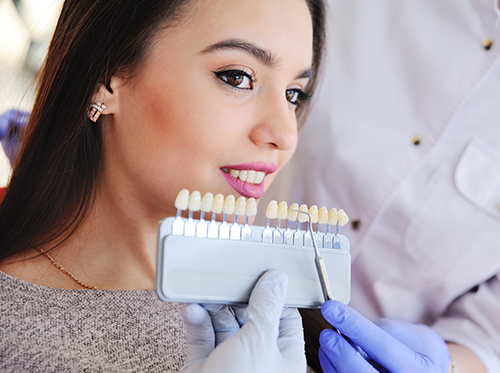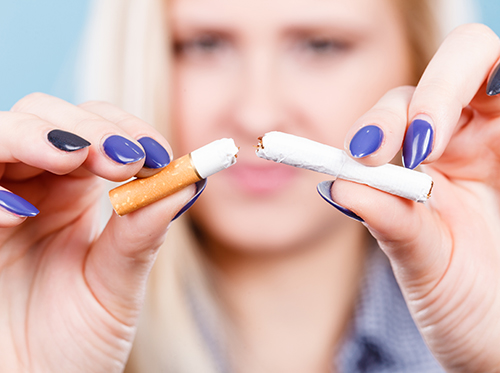March 10th, 2021

Like many other parts of the human body, teeth age. You may look at old photos and realize your smile was significantly brighter in the past than it is now. Many adults experience tooth discoloration and find it embarrassing.
The good news is there are treatment options! The first step to recovering your bright smile and finding appropriate treatment is to determine what’s causing the discoloration.
There are multiple reasons for tooth discoloration. Some are under your control, but unfortunately, others may not be. Glance at the list below and see if you can pinpoint the cause of your tooth discoloration.
- Poor Dental Hygiene: This one is obvious. There’s a reason your parents (and dentist) always told you to brush and floss three times a day.
- Genetics: A big part of your dental health is determined by genetics; in other words, what runs in your family. Sometimes people inherit naturally discolored teeth.
- Diet: Do you eat sugary foods often? Drink lots of soda? Gulp more than two cups of coffee a day? Are you an energy drink fan? We’re not pointing any fingers ... but you should do the math.
- Tobacco: Because cigarettes contain nicotine, they can readily stain your teeth. So hardcore smokers often develop prominent brown stains.
- Medications: Medicines such as doxycycline, tetracycline, antihistamines, blood-pressure medications, and antipsychotic drugs can all create tooth discoloration as a side effect. (If you suspect this could be the case for you, don’t ever discontinue your medication without consulting your doctor first!)
Did you find the culprit? Perhaps the easiest way to avoid tooth discoloration in your case might be to make some simple adjustments to your diet and other habits.
Also, when you consume drinks or foods that are high in acid or sugar content, take a moment to rinse your mouth with water afterward. If you’re an avid tobacco user, you may want to reconsider that; especially because it can have deadly effects that go way beyond your smile.
Dr. Jeffery Spahr and Dr. Janna Spahr can also suggest other treatment options. While over-the-counter agents do help, in-office whitening treatments tend to be more effective. If whitening agents don’t alleviate the problem, you may want to consider bondings or veneers.
If you’re worried about discoloration of your teeth, or have any questions about how to treat it, please feel free to reach out to our Lincoln, NE office! We can help you identify what may be causing the problem and work with you to give you a smile you’ll be proud of.
March 3rd, 2021

One problem with trying to answer the question as to who benefits from Invisalign is that the simple answer is “almost everyone.” The see-through, almost invisible aligners for straightening teeth are specifically molded to fit each individual’s mouth. Unlike conventional braces, they can be removed when eating and when cleaning the teeth. Because they use less force in straightening teeth than metal braces, the risk of harm to teeth is lessened.
Benefits to adults
Traditional braces are associated with children and teenagers. Many adults want to have their teeth straightened but cannot decide which is worse: having crooked teeth or wearing metal braces. They also worry about having to change their diet by not being able to eat the foods they normally enjoy.
If you are an adult considering braces, our team at Fallbrook Family Dentistry will tell you Invisalign aligners will give you the best of all worlds. Your teeth will be straightened with virtually invisible braces. You can remove your aligners when you eat so you can enjoy any food you normally would consume. You do not have to worry about embarrassing yourself by getting food stuck in your braces. You simply clean your teeth normally after eating and replace your aligners. If there is a special occasion during which you do not want to have any braces at all, you can remove the aligners for a few hours without causing any damage.
Benefits to teenagers
Dr. Jeffery Spahr and Dr. Janna Spahr and our team know that teenagers are often involved in contact sports or gymnastics. Others find that having metal in their mouth interferes with their ability to play a musical instrument. Traditional metal braces contain wires and brackets that can cause damage to the mouth and gums; this is not a risk with Invisalign aligners.
For sports that require players to wear mouthguards, the expense of specially constructed mouthguards to fit over braces is avoided. The aligners can be removed during sports activity, and a normal mouthguard is worn. Teenagers who play musical instruments simply remove the aligners when practicing or playing in the band or orchestra.
Teenagers often feel they are too busy to spend time and trouble flossing teeth between the wires and brackets of traditional braces. Since the Invisalign aligners are removable, brushing and flossing are simpler and more likely to be performed.
For more information about Invisalign or Invisalign Teen, or to schedule an initial consultation with Dr. Jeffery Spahr and Dr. Janna Spahr, please give us a call at our convenient Lincoln, NE office!
February 24th, 2021

According to the Oral Cancer Foundation, this form of cancer kills roughly one person an hour, every 24 hours. This means that nearly 10,000 people will die this year from this type of cancer.
Often, the cancer is discovered late, which is the main reason the death rate is unfortunately so high. Dr. Jeffery Spahr and Dr. Janna Spahr and our team want you to know the precautionary steps you can take to avoid oral cancer.
Here are some of the most effective methods:
- Good oral hygiene is the first step in oral cancer prevention.
- Visit our Lincoln, NE office every six months for a dental exam.
- Quit smoking or using chewing tobacco, if you do.
- Limit alcohol consumption.
- Maintain a healthy, well-balanced diet.
- Consume cancer-fighting foods such as vegetables, berries, garlic, green tea, etc.
- Change how you prepare foods; baked, boiled, or steamed foods are healthier than grilled or fried.
- Exercise regularly to maintain a healthy immune system.
- Limit the amount of time you spend in the sun, and be sure to use sunscreen.
- Conduct an oral self-exam each week.
We know the thought of oral cancer can be frightening, so we hope the above advice can help patients catch it early or prevent it from ever happening. If you notice a negative change in your oral health, contact our Lincoln, NE location right away and schedule an appointment with Dr. Jeffery Spahr and Dr. Janna Spahr.
If you’re ever concerned or have questions about this common form of cancer, don’t hesitate to ask a member of our team.
February 17th, 2021

If you have never had a crown before, you might be wondering why crown treatment is best, what the procedure involves, and which type of crown to choose. Let’s get down to the basics of crowns!
A crown is the best way to treat many dental conditions, either to strengthen and save the tooth or to improve its appearance. We might suggest a crown if you have any of the following conditions:
- A filling that needs to be replaced, without enough tooth structure left to fill properly
- A tooth that is fractured or broken, or so weak that it might fracture
- A recent root canal
- An implant
- A bridge which needs a crown to serve as the base for attachment
- A tooth that is discolored or irregularly shaped
On your first visit to our Lincoln, NE office, Dr. Jeffery Spahr and Dr. Janna Spahr will prepare the tooth that will be receiving a crown. A tooth might have to be built up if there isn’t enough of the original tooth left, or the top and sides of the tooth will be shaped down so that the crown fits smoothly and evenly with your other teeth. An impression will be made and sent to a dental lab so that a crown with the perfect fit for your tooth and mouth can be created. A temporary crown will be put in place to protect your tooth while the final crown is fabricated.
The permanent crown is a cap which covers your tooth. It can be made of various materials, which all offer different advantages:
- Metal Crowns—made of gold, platinum or base metal alloys, these are the longest lasting. Because of their metallic color, they are often chosen for back molars where they are less visible.
- Porcelain Over Metal—because the color of the porcelain is matched to your natural teeth, these crowns look very realistic. Porcelain is more fragile than metal, so there is the possibility that they won’t be as durable.
- Resin—less expensive than other options, but these crowns are more fragile and do not wear as well.
- All Porcelain/All Ceramic—the most realistic looking option, especially for front teeth, and also suitable for anyone with a metal allergy. They are, again, not as strong as metal crowns, and can be subject to damage.
- Stainless Steel—often used for baby teeth or as a temporary crown for adult teeth.
We’ll discuss your options and help you decide on the best type of crown for you. When the crown is finished at the dental lab, you will have one more visit where the crown will be secured in place. We will make sure your bite is comfortable and the color and appearance of the crown are satisfactory. We will also give you instructions for the next few days following the procedure, and can make adjustments if needed.
A crown is a perfect example of form and function working together: a crown maintains the beauty of your smile and preserves the health of your tooth. If you need a crown, we will be happy to talk to you about your best options for a strong, long-lasting, and natural smile.






